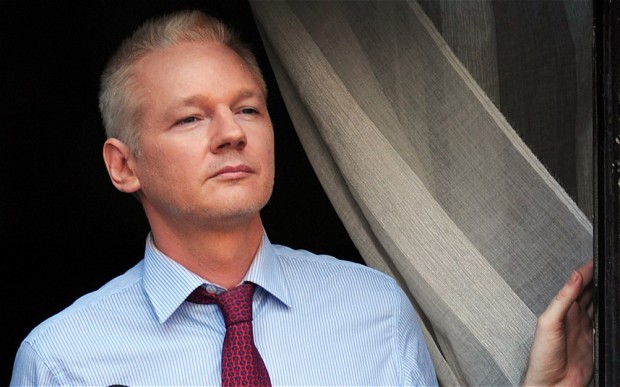Julian Assange, the alleged Bill Cosby of Wikileaks, can be a preposterous blowhard, but that doesn’t mean he hasn’t been a useful part of the discussion about surveillance. At Spiegel, Michael Sontheimer has a new longform Q&A with Assange, in which they discuss what might be called Wikileaks 2.0, as well as the “digital colonization of the world” by Silicon Valley powerhouses, this era’s analog of America’s twentieth-century cultural exportation of Hollywood and hamburgers.
An excerpt:
Spiegel:
You met Eric Schmidt, the CEO of Google. Do you think he is a dangerous man?
Julian Assange:
If you ask “Does Google collect more information than the National Security Agency?” the answer is “no,” because NSA also collects information from Google. The same applies to Facebook and other Silicon Valley-based companies. They still collect a lot of information and they are using a new economic model which academics call “surveillance capitalism.” General information about individuals is worth little, but when you group together a billion individuals, it becomes strategic like an oil or gas pipeline.
Spiegel:
Secret services are perceived as potential criminals but the big IT corporations are perceived at least in an ambiguous way. Apple produces beautiful computers. Google is a useful search engine.
Julian Assange:
Until the 1980s, computers were big machines designed for the military or scientists, but then the personal computers were developed and companies had to start rebranding them as machines that were helpful for individual human beings. Organizations like Google, whose business model is “voluntary” mass surveillance, appear to be giving it away for free. Free e-mail, free search, etc. Therefore it seems that they’re not a corporation, because corporations don’t do things for free. It falsely seems like they are part of civil society.
Spiegel:
And they shape the thinking of billions of users?
Julian Assange:
They are also exporting a specific mindset of culture. You can use the old term of “cultural imperialism” or call it the “Disneylandization” of the Internet. Maybe “digital colonization” is the best terminology.
Spiegel:
What does this “colonization” look like?
Julian Assange:
These corporations establish new societal rules about what activities are permitted and what information can be transmitted. Right down to how much nipple you can show. Down to really basic matters, which are normally a function of public debate and parliaments making laws. Once something becomes sufficiently controversial, it’s banned by these organizations. Or, even if it is not so controversial, but it affects the interests that they’re close to, then it’s banned or partially banned or just not promoted.
Spiegel:
So in the long run, cultural diversity is endangered?
Julian Assange:
The long-term effect is a tendency towards conformity, because controversy is eliminated. An American mindset is being fostered and spread to the rest of the world because they find this mindset to be uncontroversial among themselves. That is literally a type of digital colonialism; non-US cultures are being colonized by a mindset of what is tolerable to the staff and investors of a few Silicon Valley companies. The cultural standard of what is a taboo and what is not becomes a US standard, where US exceptionalism is uncontroversial.•
Tags: Julian Assange, Michael Sontheimer

